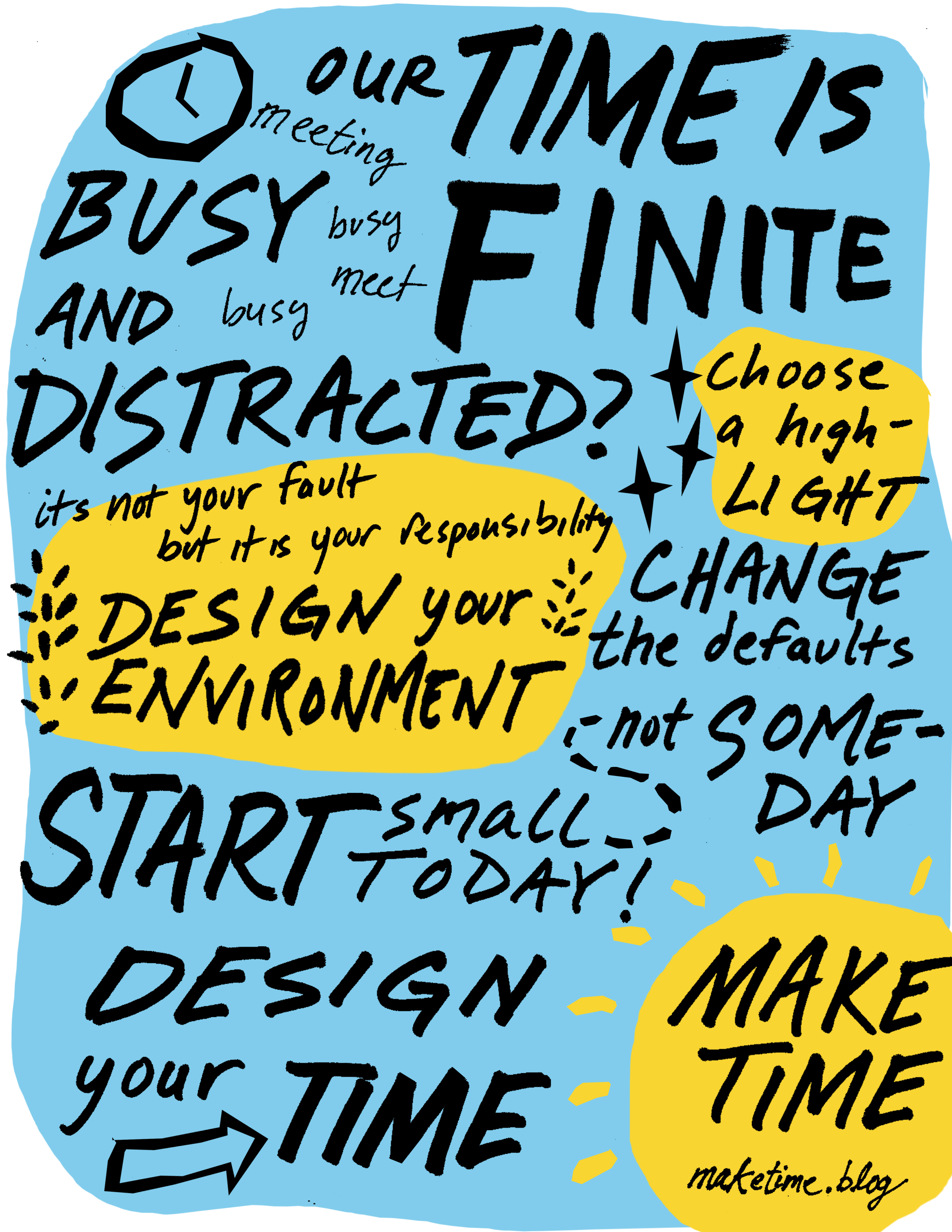Ten big ideas at the core of our approach to making time for what matters
Make Time is more than a book. More than a handy framework for planning your days around the things that matter most to you.
Make Time is a philosophy. A whole way of thinking that can help you make good decisions about time, energy, and attention.

I’ve been developing and practicing this philosophy for a long time. It helped me step back from the black hole of productivity optimization and focus on what really matters. It gave me the space to work on cool projects like running Design Sprints (we did about 150 of them at GV) and writing books. My wife and I used this philosophy to move slowly but surely, one day at a time, toward a complete life reset in which we left our jobs and spent 18 months exploring Central America by sailboat.
Lately I’ve been thinking about what’s really at the core of this philosophy. If you strip away the mechanism of the four daily steps and the details of the 87 tactics… what remains? I think it’s a set of big ideas. Beliefs. A perspective that’s honest about the way things are and hopeful about the changes we can make in our own lives.
I know there are a lot of books and articles out there about productivity, distraction, and time management. Make Time is different. It’s not macho or hardcore. It’s not a one-size-fits-all plan. Jake and I have tried plenty of those, and while we did get more done, we didn’t like how it made us feel. We created Make Time because we believe there’s a better path to focusing on what matters each day. One that’s flexible, forgiving, and friendly.
This is our philosophy.
1. Time is Our Only Finite Resource
Assets like money, energy, and health are renewable and expanding. If you lose money, you can make more. If you get tired, you can rest and recover. If you’re weak, you can become strong. But we only get a certain number of days to live our life—and we don’t know how many until they’re gone!
2. We Spend Most of Our Time by Default
Our time is finite and precious, but we don’t always treat it that way. Every day, dozens of defaults compete for our time. The apps on our phones. Our calendars. Cultural expectations and norms. When we spend our days doing what’s considered “normal,” we give away our time to anyone (or anything) who asks.
3. It’s Not Your Fault
If you feel busy and distracted, or if you look back on the day or week and wonder what happened, it’s not your fault. You didn’t waste that time because you’re weak or undisciplined or lazy. It’s the sneaky power of defaults at work. Some of these (like default-on smartphone notifications) were designed to grab our attention, while others (like default 60-minute meetings) are just weird cultural artifacts that stuck around.
4. But It is Your Responsibility
It’s not your fault if you don’t have time for what matters, but it is your responsibility to do something about it. Nobody cares more about your time than you do. You can’t wait for tech companies to make smartphones less addicting or for modern society to magically slow down. You have to be the boss of your own life.
5. You Can Change the Defaults
Fortunately, these defaults are easy to change. You can delete distracting apps from your smartphone. You can use your calendar to schedule time for your priorities, not everybody else’s. You can ignore breaking news and the stock market and avoid the advertising and the FOMO that comes with it.
6. Design Your Environment, Design Your Time
We like to think we’re in complete control of our actions, but the truth is, often we’re just reacting to our environment. So if you want to change your behavior, you need to change your environment. Create barriers to distraction. Make your bedroom a sanctuary for sleep. Incorporate walking into your daily commute. By redesigning your environment to support the decisions you want to make, you can redesign your time to focus on the people and projects that matter most to you.
7. Don’t Forget the Environment in Your Head
Changes to your mental environment—your mindset—can be just as powerful as changes to your physical environment. Changing the stories you tell yourself (like, “I’m a person who uses technology to enable personal connection, not to replace it”) can set you on the path toward decisions that reflect your values.
8. Proactive, Not Reactive
Fighting distraction and avoiding burnout can feel like a chore. To maintain momentum, you need to get proactive. What are you making time for? What’s important to you? Proactively choosing your daily Highlight can cascade into other decisions about your time, focus, and energy.
9. Start Small
No matter how big your plans or dreams, the most important thing is to get going. You don’t even have to know exactly where you’ll end up. E.L. Doctorow once said that “writing a novel is like driving a car at night. You can see only as far as your headlights, but you can make the whole trip that way.” And that’s true of any big change. Dramatic transformations rarely work. You’re better off starting small, taking back your time and attention bit by bit and day by day.
10. Today, Not Someday
We all have goals and ideas for things we want to do “someday.” But change happens in the present, not in some magical future where we have time to make all of our dreams come true. So don’t worry about someday. Don’t obsess over your goals or strive for perfect long-term plans. Instead, focus on small ways you can improve your focus, attention, and energy today, tomorrow, and the day after that. If you want to change your life, start by changing your days.
For help putting these ideas into action, check out our book Make Time. It contains pretty much everything we know about slowing down, finding focus, and making time in daily life.



